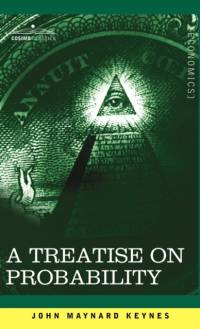Über A Treatise on Probability
There is, first of all, the distinction between that part of our belief which is rational and that part which is not. If a man believes something for a reason which is preposterous or for no reason at all, and what he believes turns out to be true for some reason not known to him, he cannot be said to believe it rationally, although he believes it and it is in fact true. On the other hand, a man may rationally believe a proposition to be probable, when it is in fact false. -from Chapter II: Probability in Relation to the Theory of Knowledge His fame as an economist aside, John Maynard Keynes may be best remembered for saying, In the long run, we are all dead. That phrase may well be the most succinct expression of the theory of probability every uttered. For a longer explanation of the premise that underlies much of modern mathematics and science, Keynes's A Treatise on Probability is essential reading. First published in 1920, this is the foundational work of probability theory, which helped establish the author's enormous influence on modern economic and even political theories. Exploring aspects of randomness and chance, inductive reasoning and logical statistics, this is a work that belongs in the library of any interested in numbers and their application in the real world. AUTHOR BIO: British economist JOHN MAYNARD KEYNES (1883-1946) also wrote The Economic Consequences of the Peace (1919), The End of Laissez-Faire (1926), The Means to Prosperity (1933), and General Theory of Employment, Interest and Money (1936).
Mehr anzeigen

